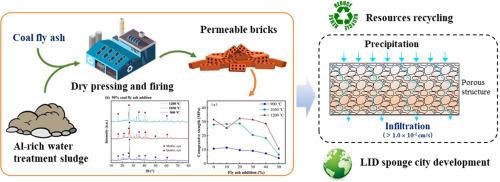利用饮用水处理污泥和粉煤灰制作透水砖,促进低影响开发
IF 11.2
1区 环境科学与生态学
Q1 ENGINEERING, ENVIRONMENTAL
引用次数: 0
摘要
在饮用水处理中使用铝混凝剂会产生大量污泥,这些污泥通常会被填埋,浪费宝贵的城市土地,并带来潜在的环境风险。研究提出了一种创新方法,将水处理产生的富含铝的污泥与粉煤灰一起回收利用,制成建筑用砖。通过改变粉煤灰比例(0-50%)和烧制温度(900-1200 °C),确定了最佳条件:焙烧温度为 1050 °C,粉煤灰添加量为 30 %-50 %。烧制出的砖符合建筑材料标准,抗压强度(7 兆帕)、孔隙率(15%-30%)、吸水率(10%-20%)和渗透率(1.0 × 10-2 厘米/秒)均达到要求。加入粉煤灰可减轻收缩和裂缝的形成。在制砖过程中点燃污泥中的有机物可形成多孔结构,非常适合低影响开发,如海绵城市中的透水路面。这种方法促进了废物减量、铝回收、重金属稳定化和可持续城市发展,为安全透水砖提供了一种具有成本效益的解决方案。本文章由计算机程序翻译,如有差异,请以英文原文为准。

Utilization of drinking water treatment sludge with coal fly ash to make permeable bricks for low impact development
The use of aluminum coagulants for drinking water treatment generates a large amount of sludge that is typically destined to landfills, wasting valuable urban land with potential environmental risks. An innovative approach was presented to recycling aluminum-rich sludge from water treatment, alongside coal fly ash, into bricks for construction. By varying fly ash ratios (0–50 %) and firing temperatures (900–1200 °C), optimal conditions were determined: 1050 °C firing temperature and 30 %-50 % fly ash addition. The resulting bricks meet construction material standards, boasting compressive strength (>7 MPa), porosity (15–30 %), water absorption (10–20 %), and permeability (>1.0 × 10−2 cm/s). Incorporating fly ash mitigates shrinkage and crack formation. Organic matter ignition in sludge during brick-making creates a porous structure, ideal for low-impact development like permeable pavements in sponge cities. This method promotes waste reduction, aluminum recycling, heavy metal stabilization, and sustainable urban development, offering a cost-effective solution for safe, permeable bricks.
求助全文
通过发布文献求助,成功后即可免费获取论文全文。
去求助
来源期刊

Resources Conservation and Recycling
环境科学-工程:环境
CiteScore
22.90
自引率
6.10%
发文量
625
审稿时长
23 days
期刊介绍:
The journal Resources, Conservation & Recycling welcomes contributions from research, which consider sustainable management and conservation of resources. The journal prioritizes understanding the transformation processes crucial for transitioning toward more sustainable production and consumption systems. It highlights technological, economic, institutional, and policy aspects related to specific resource management practices such as conservation, recycling, and resource substitution, as well as broader strategies like improving resource productivity and restructuring production and consumption patterns.
Contributions may address regional, national, or international scales and can range from individual resources or technologies to entire sectors or systems. Authors are encouraged to explore scientific and methodological issues alongside practical, environmental, and economic implications. However, manuscripts focusing solely on laboratory experiments without discussing their broader implications will not be considered for publication in the journal.
 求助内容:
求助内容: 应助结果提醒方式:
应助结果提醒方式:


